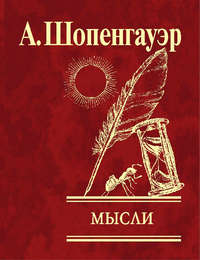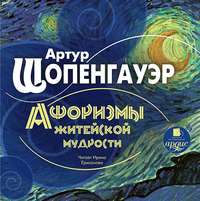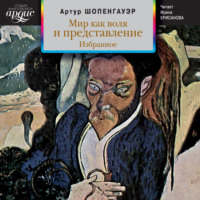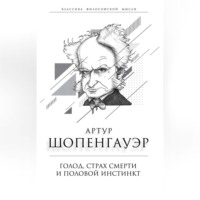 полная версия
полная версияThe World as Will and Idea (Vol. 2 of 3)
In the chapter on the ultimate aim of the natural dialectic of reason it is asserted that the three transcendent Ideas are of value as regulative principles for the advancement of the knowledge of nature. But Kant can barely have been serious in making this assertion. At least its opposite, that these assumptions are restrictive and fatal to all investigation of nature, is to every natural philosopher beyond doubt. To test this by an example, let any one consider whether the assumption of the soul as an immaterial, simple, thinking substance would have been necessarily advantageous or in the highest degree impeding to the truths which Cabanis has so beautifully expounded, or to the discoveries of Flourens, Marshall Hall, and Ch. Bell. Indeed Kant himself says (Prolegomena, § 44), “The Ideas of the reason are opposed and hindering to the maxims of the rational knowledge of nature.”
It is certainly not the least merit of Frederick the Great, that under his Government Kant could develop himself, and dared to publish the “Critique of Pure Reason.” Hardly under any other Government would a salaried professor have ventured such a thing. Kant was obliged to promise the immediate successor of the great king that he would write no more.
I might consider that I could dispense with the criticism of the ethical part of the Kantian philosophy here because I have given a detailed and thorough criticism of it twenty-two years later than the present work in the “Beiden Grundproblemen der Ethik.” However, what is here retained from the first edition, and for the sake of completeness must not be omitted, may serve as a suitable introduction to that later and much more thorough criticism, to which in the main I therefore refer the reader.
On account of Kant's love of architectonic symmetry, the theoretical reason had also to have a pendant. The intellectus practicus of the Scholastics, which again springs from the νους πρακτικος of Aristotle (De Anima, iii. 10, and Polit., vii. c. 14: ὁ μεν γαρ πρακτικος εστι λογος, ὁ δε θεωρητικος), provides the word ready made. Yet here something quite different is denoted by it – not as there, the reason directed to technical skill. Here the practical reason appears as the source and origin of the undeniable ethical significance of human action, and of all virtue, all nobleness, and every attainable degree of holiness. All this accordingly should come from mere reason, and demand nothing but this. To act rationally and to act virtuously, nobly, holily, would be one and the same; and to act selfishly, wickedly, viciously, would be merely to act irrationally. However, all times and peoples and languages have distinguished the two, and held them to be quite different things; and so does every one even at the present day who knows nothing of the language of the new school, i. e., the whole world, with the exception of a small company of German savants. Every one but these last understands by virtuous conduct and a rational course of life two entirely different things. To say that the sublime founder of the Christian religion, whose life is presented to us as the pattern of all virtue, was the most rational of all men would be called a very unbecoming and even a blasphemous way of speaking; and almost as much so if it were said that His precepts contained all the best directions for a perfectly rational life. Further, that he who, in accordance with these precepts, instead of taking thought for his own future needs, always relieves the greater present wants of others, without further motive, nay, gives all his goods to the poor, in order then, destitute of all means of subsistence, to go and preach to others also the virtue which he practises himself; this every one rightly honours; but who ventures to extol it as the highest pitch of reasonableness? And finally, who praises it as a rational deed that Arnold von Winkelried, with surpassing courage, clasped the hostile spears against his own body in order to gain victory and deliverance for his countrymen? On the other hand, if we see a man who from his youth upwards deliberates with exceptional foresight how he may procure for himself an easy competence, the means for the support of wife and children, a good name among men, outward honour and distinction, and in doing so never allows himself to be led astray or induced to lose sight of his end by the charm of present pleasures or the satisfaction of defying the arrogance of the powerful, or the desire of revenging insults and undeserved humiliations he has suffered, or the attractions of useless aesthetic or philosophical occupations of the mind, or travels in interesting lands, but with great consistency works towards his one end, – who ventures to deny that such a philistine is in quite an extraordinary degree rational, even if he has made use of some means which are not praiseworthy but are yet without danger? Nay, more, if a bad man, with deliberate shrewdness, through a well-thought-out plan attains to riches and honours, and even to thrones and crowns, and then with the acutest cunning gets the better of neighbouring states, overcomes them one by one, and now becomes a conqueror of the world, and in doing so is not led astray by any respect for right, any sense of humanity, but with sharp consistency tramples down and dashes to pieces everything that opposes his plan, without compassion plunges millions into misery of every kind, condemns millions to bleed and die, yet royally rewards and always protects his adherents and helpers, never forgetting anything, and thus reaches his end, – who does not see that such a man must go to work in a most rational manner? – that, as a powerful understanding was needed to form the plans, their execution demanded the complete command of the reason, and indeed properly of practical reason? Or are the precepts which the prudent and consistent, the thoughtful and far-seeing Machiavelli prescribes to the prince irrational?10
As wickedness is quite consistent with reason, and indeed only becomes really terrible in this conjunction, so, conversely, nobleness is sometimes joined with want of reason. To this may be attributed the action of Coriolanus, who, after he had applied all his strength for years to the accomplishment of his revenge upon the Romans, when at length the time came, allowed himself to be softened by the prayers of the Senate and the tears of his mother and wife, gave up the revenge he had so long and so painfully prepared, and indeed, by thus bringing on himself the just anger of the Volscians, died for those very Romans whose thanklessness he knew and desired so intensely to punish. Finally, for the sake of completeness, it may be mentioned that reason may very well exist along with want of understanding. This is the case when a foolish maxim is chosen, but is followed out consistently. An example of this is afforded by the case of the Princess Isabella, daughter of Philip II., who vowed that she would not put on a clean chemise so long as Ostend remained unconquered, and kept her word through three years. In general all vows are of this class, whose origin is a want of insight as regards the law of causality, i. e., want of understanding; nevertheless it is rational to fulfil them if one is of such narrow understanding as to make them.
In agreement with what we have said, we see the writers who appeared just before Kant place the conscience, as the seat of the moral impulses, in opposition to the reason. Thus Rousseau, in the fourth book of “Emile,” says: “La raison nous trompe, mais la conscience ne trompe jamais;” and further on: “Il est impossible d'expliquer par les conséquences de notre nature le principe immédiat de la conscience indépendant de la raison même.” Still further: “Mes sentimens naturels parlaient pour l'intérêt commun, ma raison rapportait tout a moi… On a beau vouloir etablir la vertu par la raison seul, quelle solide base peut-on lui donner?” In the “Rêveries du Promeneur,” prom. 4 ême, he says: “Dans toutes les questions de morale difficiles je me suis tojours bien trouvé de les résoudre par le dictamen de la conscience, plutôt que par les lumières de la raison.” Indeed Aristotle already says expressly (Eth. Magna, i. 5) that the virtues have their seat in the αλογῳ μοριῳ της ψυχης (in parte irrationali animi), and not in the λογον εχοντι (in parte rationali). In accordance with this, Stobæus says (Ecl., ii, c.7), speaking of the Peripatetics: “Την ηθικην αρετην ὑπολαμβανουσι περι το αλογον μερος γιγνεσθαι της ψυχης, επειδη διμερη προς την παρουσαν θεωριαν ὑπεθεντο την ψυχην, το μεν λογικον εχουσαν, το δ᾽ αλογον. Και περι μεν το λογικον την καλοκαγαθιαν γιγνεσθαν, και την φρονησιν, και την αγχινοιαν, και σοφιαν, και ευμαθειαν, και μνημην, και τας ὁμοιους; περι δε το αλογον, σωφροσυνην, και δικαιοσυνην, και ανδρειαν, και τας αλλας τας ηθικας καλουμενας αρετας.” (Ethicam virtutem circa partem animæ ratione carentem versari putant, cam duplicem, ad hanc disquisitionem, animam ponant, ratione præditam, et ea carentem. In parte vero ratione prædita collocant ingenuitatem, prudentiam, perspicacitatem, sapientiam, docilitatem, memoriam et reliqua; in parte vero ratione destituta temperantiam, justitiam, fortitadinem, et reliquas virtutes, quas ethicas vocant.) And Cicero (De Nat. Deor., iii., c. 26-31) explains at length that reason is the necessary means, the tool, of all crime.
I have explained reason to be the faculty of framing concepts. It is this quite special class of general non-perceptible ideas, which are symbolised and fixed only by words, that distinguishes man from the brutes and gives him the pre-eminence upon earth. While the brute is the slave of the present, and knows only immediate sensible motives, and therefore when they present themselves to it is necessarily attracted or repelled by them, as iron is by the magnet, in man, on the contrary, deliberation has been introduced through the gift of reason.
This enables him easily to survey as a whole his life and the course of the world, looking before and after; it makes him independent of the present, enables him to go to work deliberately, systematically, and with foresight, to do evil as well as to do good. But what he does he does with complete self-consciousness; he knows exactly how his will decides, what in each case he chooses, and what other choice was in the nature of the case possible; and from this self-conscious willing he comes to know himself and mirrors himself in his actions. In all these relations to the conduct of men reason is to be called practical; it is only theoretical so far as the objects with which it is concerned have no relation to the action of the thinker, but have purely a theoretical interest, which very few men are capable of feeling. What in this sense is called practical reason is very nearly what is signified by the Latin word prudentia, which, according to Cicero (De Nat. Deor. ii., 22), is a contraction of providentia; while, on the other hand, ratio, if used of a faculty of the mind, signifies for the most part theoretical reason proper, though the ancients did not observe the distinction strictly. In nearly all men reason has an almost exclusively practical tendency; but if this also is abandoned thought loses the control of action, so that it is then said, “Scio meliora, proboque, deteriora sequor,” or “Le matin je fais des projets, et le soir je fais des sottises.” Thus the man does not allow his conduct to be guided by his thought, but by the impression of the moment, after the manner of the brute; and so he is called irrational (without thereby imputing to him moral turpitude), although he is not really wanting in reason, but in the power of applying it to his action; and one might to a certain extent say his reason is theoretical and not practical. He may at the same time be a really good man, like many a one who can never see any one in misfortune without helping him, even making sacrifices to do so, and yet leaves his debts unpaid. Such an irrational character is quite incapable of committing great crimes, because the systematic planning, the discrimination and self-control, which this always requires are quite impossible to him. Yet, on the other hand, he will hardly attain to a very high degree of virtue, for, however much inclined to good he may be by nature, those single vicious and wicked emotions to which every one is subject cannot be wanting; and where reason does not manifest itself practically, and oppose to them unalterable maxims and firm principles, they must become deeds.
Finally, reason manifests itself very specially as practical in those exceedingly rational characters who on this account are called in ordinary life practical philosophers, and who are distinguished by an unusual equanimity in disagreeable as in pleasing circumstances, an equable disposition, and a determined perseverance in resolves once made. In fact, it is the predominance of reason in them, i. e., the more abstract than intuitive knowledge, and therefore the survey of life by means of conceptions, in general and as a whole, which has enabled them once for all to recognise the deception of the momentary impression, the fleeting nature of all things, the shortness of life, the emptiness of pleasures, the fickleness of fortune, and the great and little tricks of chance. Therefore nothing comes to them unexpectedly, and what they know in the abstract does not surprise nor disturb them when it meets them in the actual and in the particular case, though it does so in the case of those less reasonable characters upon whom the present, the perceptible, the actual, exerts such an influence that the cold, colourless conceptions are thrown quite into the background of consciousness, and forgetting principles and maxims, they are abandoned to emotions and passions of every kind. I have already explained at the end of the first book that in my opinion the ethics of Stoicism were simply a guide to a truly reasonable life, in this sense. Such a life is also repeatedly praised by Horace in very many passages. This is the significance of his nil admirari, and also of the Delphic Μηδεν αγαν. To translate nil admirari “to admire nothing” is quite wrong. This Horatian maxim does not concern the theoretical so much as the practical, and its real meaning is: “Prize no object unconditionally. Do not fall in love with anything; do not believe that the possession of anything can give you happiness. Every intense longing for an object is only a delusive chimera, which one may just as well, and much more easily, get quit of by fuller knowledge as by attained possession.” Cicero also uses admirari in this sense (De Divinatione, ii. 2). What Horace means is thus the αθαμβια and ακαταπληξις, also αθαυμασια, which Democritus before him prized as the highest good (see Clem. Alex. Strom., ii. 21, and cf. Strabo, i. p. 98 and 105). Such reasonableness of conduct has properly nothing to do with virtue and vice; but this practical use of reason is what gives man his pre-eminence over the brute, and only in this sense has it any meaning and is it permissible to speak of a dignity of man.
In all the cases given, and indeed in all conceivable cases, the distinction between rational and irrational action runs back to the question whether the motives are abstract conceptions or ideas of perception. Therefore the explanation which I have given of reason agrees exactly with the use of language at all times and among all peoples – a circumstance which will not be regarded as merely accidental or arbitrary, but will be seen to arise from the distinction of which every man is conscious, of the different faculties of the mind, in accordance with which consciousness he speaks, though certainly he does not raise it to the distinctness of an abstract definition. Our ancestors did not make the words without attaching to them a definite meaning, in order, perhaps, that they might lie ready for philosophers who might possibly come centuries after and determine what ought to be thought in connection with them; but they denoted by them quite definite conceptions. Thus the words are no longer unclaimed, and to attribute to them an entirely different sense from that which they have hitherto had means to misuse them, means to introduce a licence in accordance with which every one might use any word in any sense he chose, and thus endless confusion would necessarily arise. Locke has already shown at length that most disagreements in philosophy arise from a false use of words. For the sake of illustration just glance for a moment at the shameful misuse which philosophers destitute of thoughts make at the present day of the words substance, consciousness, truth, and many others. Moreover, the utterances and explanations concerning reason of all philosophers of all ages, with the exception of the most modern, agree no less with my explanation of it than the conceptions which prevail among all nations of that prerogative of man. Observe what Plato, in the fourth book of the Republic, and in innumerable scattered passages, calls the λογιμον, or λογιστικον της ψυχης, what Cicero says (De Nat. Deor., iii. 26-31), what Leibnitz and Locke say upon this in the passages already quoted in the first book. There would be no end to the quotations here if one sought to show how all philosophers before Kant have spoken of reason in general in my sense, although they did not know how to explain its nature with complete definiteness and distinctness by reducing it to one point. What was understood by reason shortly before Kant's appearance is shown in general by two essays of Sulzer in the first volume of his miscellaneous philosophical writings, the one entitled “Analysis of the Conception of Reason,” the other, “On the Reciprocal Influence of Reason and Language.” If, on the other hand, we read how reason is spoken about in the most recent times, through the influence of the Kantian error, which after him increased like an avalanche, we are obliged to assume that the whole of the wise men of antiquity, and also all philosophers before Kant, had absolutely no reason at all; for the immediate perceptions, intuitions, apprehensions, presentiments of the reason now discovered were as utterly unknown to them as the sixth sense of the bat is to us. And as far as I am concerned, I must confess that I also, in my weakness, cannot comprehend or imagine that reason which directly perceives or apprehends, or has an intellectual intuition of the super-sensible, the absolute, together with long yarns that accompany it, in any other way than as the sixth sense of the bat. This, however, must be said in favour of the invention or discovery of such a reason, which at once directly perceives whatever you choose, that it is an incomparable expedient for withdrawing oneself from the affair in the easiest manner in the world, along with one's favourite ideas, in spite of all Kants, with their Critiques of Reason. The invention and the reception it has met with do honour to the age.
Thus, although what is essential in reason (το λογιμον, ἡ φρονησις, ratio, raison, Vernunft) was, on the whole and in general, rightly understood by all philosophers of all ages, though not sharply enough defined nor reduced to one point, yet it was not so clear to them what the understanding (νους, διανοια, intellectus, esprit, Verstand) is. Therefore they often confuse it with reason, and just on this account they did not attain to a thoroughly complete, pure, and simple explanation of the nature of the latter. With the Christian philosophers the conception of reason received an entirely extraneous, subsidiary meaning through the opposition of it to revelation. Starting, then, from this, many are justly of opinion that the knowledge of the duty of virtue is possible from mere reason, i. e., without revelation. Indeed this aspect of the matter certainly had influence upon Kant's exposition and language. But this opposition is properly of positive, historical significance, and is therefore for philosophy a foreign element, from which it must keep itself free.
We might have expected that in his critiques of theoretical and practical reason Kant would have started with an exposition of the nature of reason in general, and, after he had thus defined the genus, would have gone on to the explanation of the two species, showing how one and the same reason manifests itself in two such different ways, and yet, by retaining its principal characteristic, proves itself to be the same. But we find nothing of all this. I have already shown how inadequate, vacillating, and inconsistent are the explanations of the faculty he is criticising, which he gives here and there by the way in the “Critique of Pure Reason.” The practical reason appears in the “Critique of Pure Reason” without any introduction, and afterwards stands in the “Critique” specially devoted to itself as something already established. No further account of it is given, and the use of language of all times and peoples, which is treated with contempt, and the definitions of the conception given by the greatest of earlier philosophers, dare not lift up their voices. In general, we may conclude from particular passages that Kant's opinion amounts to this: the knowledge of principles a priori is the essential characteristic of reason: since now the knowledge of the ethical significance of action is not of empirical origin, it also is an a priori principle, and accordingly proceeds from the reason, and therefore thus far the reason is practical. I have already spoken enough of the incorrectness of this explanation of reason. But, independently of this, how superficial it is, and what a want of thoroughness it shows, to make use here of the single quality of being independent of experience in order to combine the most heterogeneous things, while overlooking their most essential and immeasurable difference in other respects. For, even assuming, though we do not admit it, that the knowledge of the ethical significance of action springs from an imperative lying in us, an unconditioned ought, yet how fundamentally different would such an imperative be from those universal forms of knowledge of which, in the “Critique of Pure Reason,” Kant proves that we are conscious a priori, and by virtue of which consciousness we can assert beforehand an unconditioned must, valid for all experience possible for us. But the difference between this must, this necessary form of all objects which is already determined in the subject, and that ought of morality is so infinitely great and palpable that the mere fact that they agree in the one particular that neither of them is empirically known may indeed be made use of for the purpose of a witty comparison, but not as a philosophical justification for regarding their origin as the same.
Moreover, the birthplace of this child of practical reason, the absolute ought or the categorical imperative, is not in the “Critique of Practical Reason,” but in that of “Pure Reason,” p. 802; V. 830. The birth is violent, and is only accomplished by means of the forceps of a therefore, which stands boldly and audaciously, indeed one might say shamelessly, between two propositions which are utterly foreign to each other and have no connection, in order to combine them as reason and consequent. Thus, that not merely perceptible but also abstract motives determine us, is the proposition from which Kant starts, expressing it in the following manner: “Not merely what excites, i. e., what affects the senses directly, determines human will, but we have a power of overcoming the impressions made upon our sensuous appetitive faculty through ideas of that which is itself in a more remote manner useful or hurtful. These deliberations as to what is worthy of desire, with reference to our whole condition, i. e., as to what is good and useful, rest upon reason.” (Perfectly right; would that he only always spoke so rationally of reason!) “Reason therefore gives! also laws, which are imperatives, i. e., objective laws of freedom, and say what ought to take place, though perhaps it never does take place”! Thus, without further authentication, the categorical imperative comes into the world, in order to rule there with its unconditioned ought– a sceptre of wooden iron. For in the conception “ought” there lies always and essentially the reference to threatened punishment, or promised reward, as a necessary condition, and cannot be separated from it without abolishing the conception itself and taking all meaning from it. Therefore an unconditioned ought is a contradictio in adjecto. It was necessary to censure this mistake, closely as it is otherwise connected with Kant's great service to ethics, which consists in this, that he has freed ethics from all principles of the world of experience, that is, from all direct or indirect doctrines of happiness, and has shown in a quite special manner that the kingdom of virtue is not of this world. This service is all the greater because all ancient philosophers, with the single exception of Plato, thus the Peripatetics, the Stoics, and the Epicureans, sought by very different devices either to make virtue and happiness dependent on each other in accordance with the principle of sufficient reason, or to identify them in accordance with the principle of contradiction. This charge applies with equal force to all modern philosophers down to Kant. His merit in this respect is therefore very great; yet justice demands that we should also remember here first that his exposition and elaboration often does not correspond with the tendency and spirit of his ethics, and secondly that, even so, he is not really the first who separated virtue from all principles of happiness. For Plato, especially in the “Republic,” the principal tendency of which is just this, expressly teaches that virtue is to be chosen for itself alone, even if unhappiness and ignominy are inevitably connected with it. Still more, however, Christianity preaches a perfectly unselfish virtue, which is practised not on account of the reward in a life after death, but quite disinterestedly from love to God, for works do not justify, but only faith, which accompanies virtue, so to speak, as its symptom, and therefore appears quite irrespective of reward and of its own accord. See Luther's “De Libertate Christiana.” I will not take into account at all the Indians, in whose sacred books the hope of a reward for our works is everywhere described as the way of darkness, which can never lead to blessedness. Kant's doctrine of virtue, however, we do not find so pure; or rather the exposition remains far behind the spirit of it, and indeed falls into inconsistency. In his highest good, which he afterwards discussed, we find virtue united to happiness. The ought originally so unconditioned does yet afterwards postulate one condition, in order to escape from the inner contradiction with which it is affected and with which it cannot live. Happiness in the highest good is not indeed really meant to be the motive for virtue; yet there it is, like a secret article, the existence of which reduces all the rest to a mere sham contract. It is not really the reward of virtue, but yet it is a voluntary gift for which virtue, after work accomplished, stealthily opens the hand. One may convince oneself of this from the “Critique of Practical Reason” (p. 223-266 of the fourth, or p. 264-295 of Rosenkranz's, edition). The whole of Kant's moral theology has also the same tendency, and just on this account morality really destroys itself through moral theology. For I repeat that all virtue which in any way is practised for the sake of a reward is based upon a prudent, methodical, far-seeing egoism.









